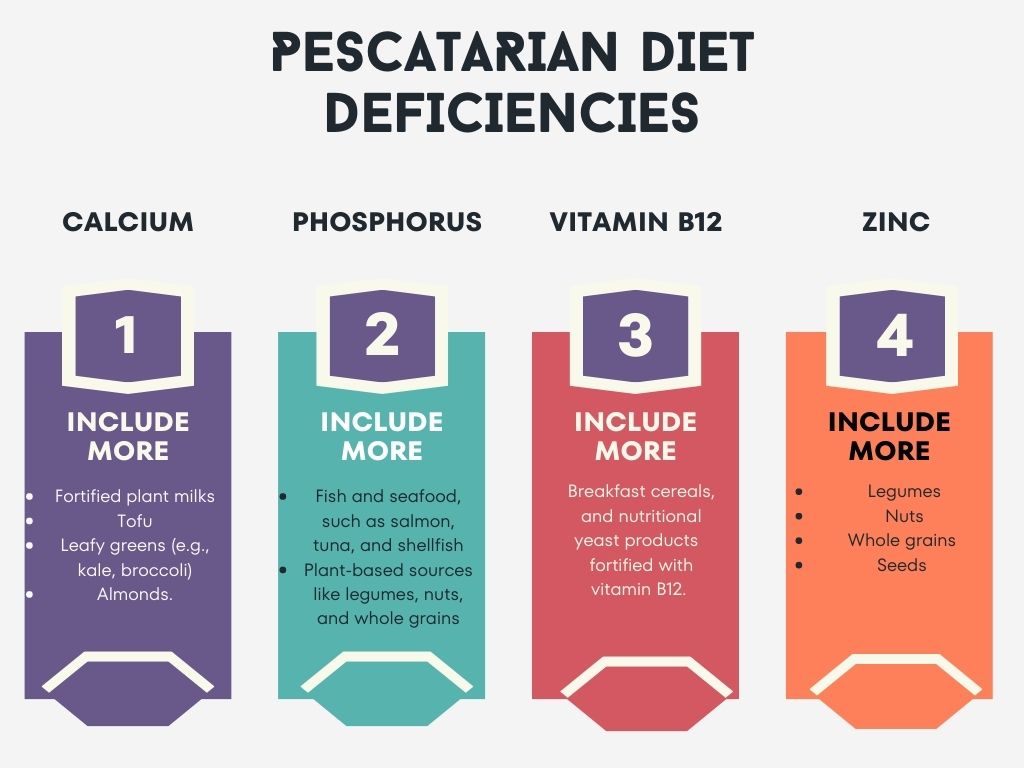The Pescatarian diet is a plant-based diet that gained popularity recently as it differs from regular vegettarian diet by the of fish and seafood as primary protein sources.
Even though the pescatarian diet deficiencies are obvious, still it helps to fill in many of the nutritional gaps that can occur in a traditional vegetarian diet because fatty seafood includes vitamin D and healthy omega-3 fatty acids and entire fish, like anchovies, can be a good source of calcium. Vitamin B12, which is sometimes low in vegetarian diets, is also present in seafood.
Another mineral that vegetarians occasionally find themselves missing is iron, primarily because plant-based meals contain non-heme iron. However, fish and shellfish sources can be surprisingly rich in iron.
While the Pescatarian diet offers numerous advantages, it is essential to be aware of potential deficiencies that may arise from this eating pattern.
Like any specialized diet, the Pescatarian diet can present certain challenges in meeting specific nutrient requirements. By eliminating meat and poultry from their diet, individuals may be at a higher risk of developing deficiencies in certain essential nutrients.
Check out our latest posts:
- Menopausal Diet for Weight Loss: What to Eat to Shed Pounds and Balance Hormones
- Best Diet For Perimenopause Belly Fat: Effective Foods to Target Hormonal Weight Gain
- Hashimoto Disease Diet Plan: What to Eat to Support Thyroid Health
- Cycle Syncing Diet: Optimize Your Health with Hormone-Based Nutrition
- No Processed Food Diet: Refeed Your Body
What are pescatarian diet deficiencies?
The Pescatarian diet, which combines plant-based foods with fish and seafood, offers numerous health benefits. However, like any other diet, it can present potential deficiencies in certain essential nutrients.
Some pescatarians may choose not to consume eggs or dairy, which can lead to inadequate intake of crucial nutrients such as calcium, phosphorus, vitamin B12, and zinc. In this section, we will explore these deficiencies in more detail and discuss strategies to address them.
Calcium
Calcium is a vital mineral for maintaining strong bones and teeth, as well as supporting proper muscle function and nerve signaling. Dairy products are a common source of calcium in many diets, but some pescatarians may exclude them.
Consequently, it is essential for pescatarians to find alternative sources of calcium. Fortunately, several plant-based foods can provide calcium, such as:
- Fortified plant milks
- Tofu
- Leafy greens (e.g., kale, broccoli)
- Almonds
Including these foods in the diet can help meet the recommended calcium intake.
Phosphorus
Phosphorus plays a crucial role in bone health, energy production, and cellular function. While dairy products are excellent sources of phosphorus, pescatarians who avoid them may need to find alternative sources.
Fortunately, some foods allowed on pescatarian diet are rich in phosphorus including:
- Fish and seafood, such as salmon, tuna, and shellfish
- Plant-based sources like legumes, nuts, and whole grains can also contribute to phosphorus intake. Ensuring a varied diet that includes these foods can help prevent phosphorus deficiency in pescatarians.
Vitamin B12
Vitamin B12 is an essential nutrient involved in red blood cell production, nerve function, and DNA synthesis. It is primarily found in animal-derived products like eggs and dairy. Pescatarians who exclude these foods may be at risk of vitamin B12 deficiency.
To address this deficiency, pescatarians can consider incorporating:
- Fortified plant-based foods into their diet.
- Certain plant-based milk alternatives
- Breakfast cereals, and nutritional yeast products are often fortified with vitamin B12.
- Including these fortified foods can help meet the recommended intake of this crucial nutrient.
In some cases, pescatarians may opt for vitamin B12 supplements to ensure adequate levels. Consulting with a healthcare professional or registered dietitian can provide guidance on appropriate supplementation and help monitor vitamin B12 levels over time.
Zinc
Zinc is a trace mineral that plays a vital role in immune function, wound healing, and DNA synthesis. While zinc is found in various animal-based foods, pescatarians who exclude or limit these foods should pay attention to their zinc intake.
Fortunately, there are plant-based sources of zinc that can be included in the pescatarian diet.
- Legumes (such as chickpeas and lentils)
- Nuts (such as cashews and almonds)
- Whole grains (such as quinoa and brown rice)
- Seeds (such as pumpkin and sesame seeds) are good sources of zinc.
Including these foods in meals and snacks can help meet zinc requirements.
It is worth noting that plant-based sources of zinc may have lower bioavailability compared to animal-based sources. To enhance zinc absorption, it can be helpful to soak, ferment, or sprout plant-based foods before consuming them.

Want to Cook Ridiculously Tasty Vegan Recipes From Scratch But Have No Idea Where To Start?
Grab your 300 Vegan/Plant Based Recipe Cook Book (CLICK THE LINK BELOW)

